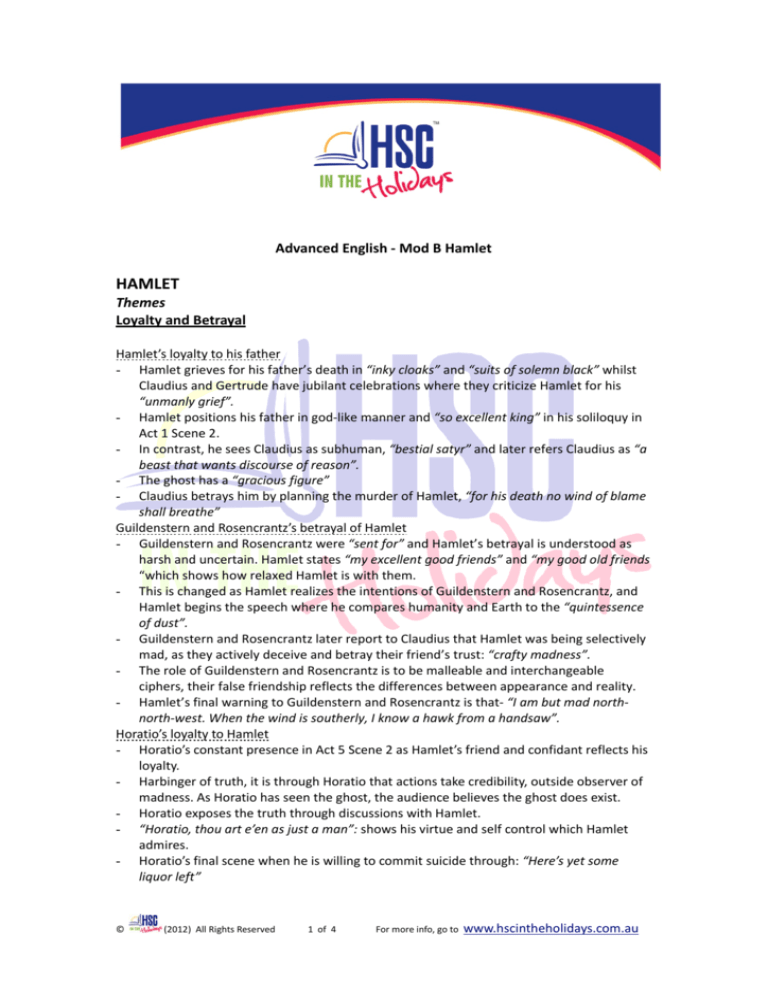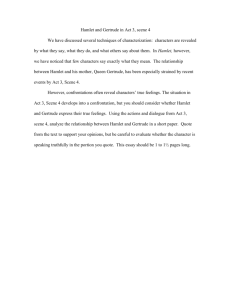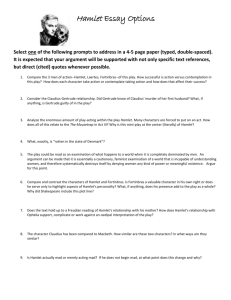
Advanced English ‐ Mod B Hamlet HAMLET Themes Loyalty and Betrayal Hamlet’s loyalty to his father - Hamlet grieves for his father’s death in “inky cloaks” and “suits of solemn black” whilst Claudius and Gertrude have jubilant celebrations where they criticize Hamlet for his “unmanly grief”. - Hamlet positions his father in god‐like manner and “so excellent king” in his soliloquy in Act 1 Scene 2. - In contrast, he sees Claudius as subhuman, “bestial satyr” and later refers Claudius as “a beast that wants discourse of reason”. - The ghost has a “gracious figure” - Claudius betrays him by planning the murder of Hamlet, “for his death no wind of blame shall breathe” Guildenstern and Rosencrantz’s betrayal of Hamlet - Guildenstern and Rosencrantz were “sent for” and Hamlet’s betrayal is understood as harsh and uncertain. Hamlet states “my excellent good friends” and “my good old friends “which shows how relaxed Hamlet is with them. - This is changed as Hamlet realizes the intentions of Guildenstern and Rosencrantz, and Hamlet begins the speech where he compares humanity and Earth to the “quintessence of dust”. - Guildenstern and Rosencrantz later report to Claudius that Hamlet was being selectively mad, as they actively deceive and betray their friend’s trust: “crafty madness”. - The role of Guildenstern and Rosencrantz is to be malleable and interchangeable ciphers, their false friendship reflects the differences between appearance and reality. - Hamlet’s final warning to Guildenstern and Rosencrantz is that‐ “I am but mad north‐
north‐west. When the wind is southerly, I know a hawk from a handsaw”. Horatio’s loyalty to Hamlet - Horatio’s constant presence in Act 5 Scene 2 as Hamlet’s friend and confidant reflects his loyalty. - Harbinger of truth, it is through Horatio that actions take credibility, outside observer of madness. As Horatio has seen the ghost, the audience believes the ghost does exist. - Horatio exposes the truth through discussions with Hamlet. - “Horatio, thou art e’en as just a man”: shows his virtue and self control which Hamlet admires. - Horatio’s final scene when he is willing to commit suicide through: “Here’s yet some liquor left” © (2012) All Rights Reserved 1 of 4 For more info, go to www.hscintheholidays.com.au Women Gertrude’s betrayal of King Hamlet - Hamlet: “frailty thy name is women”‐ Hamlet’s experiences with his incestuous mother. - “O, most wicked speed, to post with such dexterity to incestuous sheets”. - Hamlet: “you have my father much offended”‐ Hamlet is talking to Gertrude, use of ‘my’ is symbolic as it highlights the lack of connection Gertrude can have with King Hamlet. She reprimands him about his “idle tongue” whilst he retorts about her “wicked tongue”. - “Kill a king and marry with his brother”‐ Hamlet openly accuses her for low morals. - Hamlet treats his mother through violence: “Come…sit you down…you shall not budge”. Hamlet’s loyalty to Ophelia - Feminist Elaine Showalter emphasises how it was natural for Ophelia to be driven to suicide as she was abandoned by 3 powerful men (Laertes, Hamlet and Polonius) who originally made decisions for her. - “Get thee to a nunnery”: emphasises Gertrude’s lack of loyalty to King Hamlet and blames womankind. Harold Bloom emphasises that this started her path to suicide. - “Escape calumny” continues the nunnery scene as Hamlet urges Ophelia to stop actions and to seek for a monastic life for salvation. - “I lov’d Ophelia” which Hamlet said over her grave is reflective of the nunnery scene makes belated commitment to love denied in the nunnery scene. Power and Corruption It is the exploitation of power and corruption in society which makes humanity corrupt. Claudius - Claudius is a Machiavellian character. - The play within the play, The Mousetrap reflects exposure of hidden guilt, Claudius is exposed as the murderer and the ‘act’ becomes a metaphor for the confusion between reality and nature of acting. - Claudius’s soliloquy shows that he appears to desire redemption, but he actually wishes to keep his possessions. This is highlighted through the metaphors‐ “corrupted currents of the world”. - Claudius asks: “May one be pardoned and retain th’offence? My stronger guilt defeats my strong intent” within his soliloquy. This is rather emotional. - Hamlet describes him as “a little more kin than kind”, thus reflecting the notion that Claudius is closer kin then should be to Hamlet, and his gestures such as welcoming him in court is not done due to kindness. - Power struggle between Hamlet and Claudius accentuates within the entire play: Polonius - Appears to give fatherly advice to Laertes as he says “to thine own self be true”, Polonius tells Laertes to stay true to himself. - This is juxtaposed with the quote “by indirections, find directions out” when Polonius is speaking on Reynaldo and giving him tips on how to spy on Laertes: devious and Machiavellian nature exposed. - “Fishmonger” as described by Hamlet: suggests he is wily, nosy, smelly and disgusting. Metaphor of disease - Extended metaphor of disease is used to reflect corrupted nature of Denmark in the play, linking legitimacy of ruler to disease. - “There is something rotten in the state of Denmark” - King Hamlet: “Foul and most unnatural murder”: beginning of the moral dilemma for Hamlet who feels urge to revenge his father due to his love for him. - “Unweeded garden” - D.H. Lawrence: “a sense of corruption in the flesh makes Hamlet frenzied, for he will never admit that it was his own flesh”. - Metaphor of the ear, representing truth and how it can be distorted: “I have words to © (2012) All Rights Reserved 2 of 4 For more info, go to www.hscintheholidays.com.au speak in thine ear will make thee dumb” -
-
There is a sense of disorder, as the ghost is first addressed as “thou that usurp’st this time of night’ and its appearance is believed to bode “some strange eruption to our state”. Disruption of the natural order of things as Claudius marries Gertrude. Fate -
Hamlet: “the time is out of joint: o cursed spite/that I was born to set it right”: Hamlet would not always be forced to take the role of avenger: shows to audience that he would rather not be forced into situation which he finds himself now. “My fate cries out” Particular scenes Hamlet sees King Hamlet the ghost - Hamlet’s encounter with the ghost develops the contrast with Claudius; it proves Hamlet as a man of courage and decision gives dramatic shape to themes of identity, honour and corruption and raises questions about Ghost’s nature. - “Revenge the foul and most unnatural murder” The Mousetrap - “The play’s the thing wherein I’ll catch the conscience of the King” – planning of the Mousetrap. - “None wed the second but who kill’d the first”‐ the line which was used to prompt Claudius’s guilt. - Harold Bloom states that Hamlet’s nature is never confined to a single purpose but the mousetrap only had one purpose: to “catch the conscience of the King”. Claudius praying - “My words fly up, my thoughts remain below. Words without thoughts never to heaven go.”‐ Claudius kneels to show his regret and self guilt towards himself. - When sorrows come, they come not single spies, but in battalions. Scene with Hamlet and Gertrude in her bedroom - In Zeffirelli’s Hamlet, this scene is boldly handled through implications of sexual pathos and sexual violence. - Gertrude’s inability to see the ghost is important. Yorrick and the graveyard - ‘Alexander died, Alexander was buried, Alexander returneth to dust, the dust is earth, of earth we make loam”. Despite the social classes in existence, when dead, everyone becomes like ‘loam’. - Historical illusions to the death of Alexander the Great. - Feelings of death and thoughts of logic. - This scene narrows Hamlet’s contemplation to the physical corruption and inevitable end that every man is born into, which throughout the play has been an image of its cause and counterpart. - In life, Yorrick was “a fellow of infinite jest” and now is the “quintessence of dust”. - Hamlet accepts death after this scene. - In Kenneth Branaugh’s Hamlet (1996), this scene is executed using slow transitions, thus accentuating the sad nature of such scene. - Man is “the paragon of animals”, yet the “quintessence of dust”. Final battle - Laertes is a foil of Hamlet. After Polonius’s death, Laertes violent desire for revenge and to kill Hamlet is juxtaposed with Hamlet’s contemplation of murdering Claudius. - Hamlet shares with Laertes pride in skills expected of ‘absolute gentleman’. © (2012) All Rights Reserved 3 of 4 For more info, go to www.hscintheholidays.com.au Soliloquies “Bloody thoughts” in Hamlet’s 7th soliloquy, he tortures himself for not using physical means. Death - “To be or not to be” Hamlet questions life and sees suicide as a way of ending his current problems. Only speculation about what happens after death is what holds Hamlet back from committing suicide. - “For in that sleep of death what dreams may come”: use of the metaphor of sleep to show the post death possibilities. - Offers the metaphor “take arms against a sea of troubles”, a true equivalent of ‘not to be’ when futile opposition to an overwhelming natural force is seen to end troubles by ending our lives. - “Weary, stale, flat and unprofitable”, desiring to “melt”> first soliloquy. Madness - “Antic disposition”‐ the notion that Hamlet is sane throughout the entire play as he tells his friends to support him even if it appears he is going mad. - “I am but mad north‐north‐west. When the wind is southerly, I know a hawk from a handsaw”, Hamlet says this to Guildenstern and Rosencrantz, accentuates the idea that he is sane and marks the resumption of madman’s role on Polonius’s entry. -
Characters Hamlet - When the audience meets Hamlet, he is already very melancholic and does not wish to live in the corrupt world, philosophical and contemplative. - D.H. Lawrence: he is a modern man, suspicious, isolated, and labouring in a sense of physical corruption. He creeps about in self conceit, transforming his own self loathing. - TS Eliot: Hamlet is dominated by an emotion which is inexpressible, because it is in excess of the facts they appear. - He is saved from the madness which threatens but never overwhelms him, and the “antic disposition” he puts on as a cover for dangerous knowledge and purposed vengeance. - He can only act at the spur of the moment; this is evident through Polonius’s death. Claudius - Skilled in role playing, adulterous and incestuous. Shrewd, lustful. Gertrude - Gertrude’s conscience awakened does result to development of character, she loves Hamlet. Ophelia - Pathetic in her wounded love bravely borne and her madness, innocent and dutiful. Laertes - In contrast with Hamlet, he is the stock type of avenger, reckless and ruthless as he followed Claudius’s suggestion to employ the treacherous means. Polonius Fond of devious plans, spies, loving father. © (2012) All Rights Reserved 4 of 4 For more info, go to www.hscintheholidays.com.au








